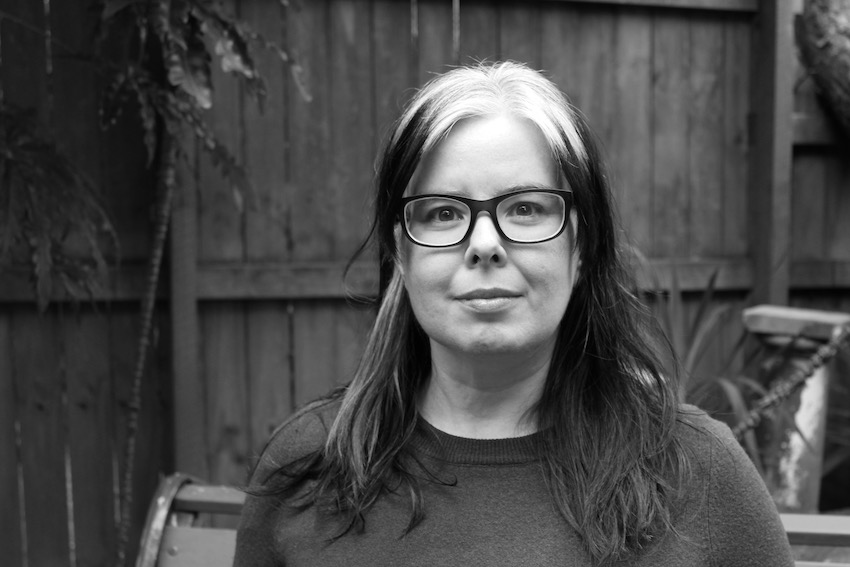From Television
it’s always Hannah, alone, Hannah eating
cupcakes, their pigfaces taunting her with
memory: when I explain girlhood I come back
to this, what bullying means, the knowledge
that she’s done this before, that she’s thrown up
in some public bathroom, deliberately, and this
is normal: not normal for me, but sometimes
I wonder that I never tried it, perhaps because
I worried for my teeth, for enamel that cannot
be remade: I know that the story is not Hannah
in the bathroom, and that they were all themselves
at sometime bullies, and yet what we see, what
we understand, is suffering: the facade of the new
It Girl discarded in a moment of fear, the moment
when eating piggies could save everything: (how
like the moment when to sink into TV and comfort
food is the only possibility): or Spencer in her car,
applying mascara again, breaking down again,
the effort to be whole too much, and those black
streaks just evidence of this: dwelling in the unbearable,
silent, on the stuck needle of grief, betrayal:
the actress says in interviews the worse Spencer looks,
the better she (the actress) feels: inhabiting
some human extreme, and pausing, unbearable,
unbearable: like the timeline, the one we obsessives
pick over, the one that makes no damn sense, the one
with all those bodies, bodies that drop in just weeks
(but years): this damn town: two TV years dwelling
on an elastic month, accordioned to utmost calamity:
how often does TV operate on time-sickness? distort
our own sense of what is possible: when does Jack
Bauer sleep?: like once, the time, six months after my last
day home sick, I turned on The Bold and the Beautiful
to find Ridge’s lost love still kidnapped, still just
on the verge of escape, the endless plot another
illustration of the risk of being a body, female, out
in public, the illness of being a body, the malady
of time spent dwelling in the open, eyes on you:
and at Rosewood High, the wondrous, ludicrous
not-quite-a-month, somehow true to despair
and self-doubt and homework and heartbreak
and mean girls and mean days and you know,
this damn school: I went to one of them
too: until at last the girls’ bodies snatched, laid out
on autopsy tables, stripped, chipped, recorded
under sedation: them waking as if from death
but it’s actually a greater violation: what is it to
lose time, to lose mind, to lose the whole lot
to the house and the house is the town, is the
show, is the audience, not just the anonymous bully,
the house is it all, is you, is me, watching their
struggle to even understand what could be real
anymore?: real doesn’t matter, what matters is
a strong brow, a perfectly glossed lip and
a finger raised to the mouth in a complicit Shh
From Television
right now—she said it as though certain, and
therefore certain, as though strong, and therefore
strong, (the way it’s said, even-toned until she
crumbles is important)—right now I’m just trying
to keep from dying: it is the moment of too much,
embarrassment of excess, the dissolution of
resolve: and it’s hard: your vampire lover, cursed,
then uncursed (or cursed differently), sent back
into his evil, at last cursed again, yanked to
some other, demonic dimension, conjugated
out of this moment with hocus pocus, returns,
and the cloud of it, of immortality matched
to the blonde a certain California reveals itself
absurd, impossible, too much, unfulfillable: there
can only be too many words to describe it, I can
only be flagellatingly verbose even though
the blonde was so direct, and the only possibility
to explain such heartbreak is hyperbolic eloquence:
she could also say, like O’Hara, all I want is
boundless love!, we all do: let’s update the phrase
—it is the lack of boundlessness we die for: once
I wrote an essay called “I was a Teenage Vampire”
because I played a game called Vampire and this
was an attempt at reckoning who I’d been:
sometimes I had feigned delicate, whipping
my body with some feeling inside of dance
into despair, tragedy; sometimes I was feral,
imagined my hair matted as it had been once
when, a child, I failed to care for it, allowed
a single knot to emerge beneath the soft, shining
surface, as if wrapped around a burr of rancour,
shame, unextractable: in Buffy there’s an episode
where the vampire wannabes show up, some
marquee Goth club underground turned panic
when the threat gets real, the kids in love
with death not at all prepared to die, not
at all prepared for the netherworld of pain,
not when all that pain already brought them
there into escapeless dark, not when they’d
already given themselves new, darker,
more consequential, names, playing games,
imagining themselves potential tragedies,
at long last important, but actually just more
discards: like when Buffy discards herself,
becomes a moment Anne, anonymous, invisible
as any disregarded waitress receding to the kitchen:
how many ways did we all try to forsake ourselves,
who we were, where we came from? to burrow
our imaginations toward some greater strength?
how did television offer up this great quaking
amnesia, the chance to roleplay into possibility:
and how often did we end up back there crying
in our bedrooms, unable to articulate the ache,
saying again, horrible is still coming, saying,
right now I’m just trying to keep from dying
From Television
what does it mean, to fully internalise
surveillance?: the girls are in trouble again,
and the panopticon lives in their guts, their
racy hearts: they know it, their guilt, their
perceived guilt, their guilty selves, buckling,
entrapped, and they expect it to come for them,
to come in messages on their televisions, in
their food, through their teeth: their therapist
knows something’s wrong too, but she has
her own panopticon to counter, to evade, so
her efforts to help are rendered impossible
by the need to cut off before confession is made:
the dolls are spouting their lines again, desperate
banter, and they’re my lines, the lines that say
it’s okay, I’m okay, the rope of self-surveillance
is not yet too tight: is that proclamation, I’m
okay, the source, twinning girlhood and
dishonesty?: (and how long have I been saying
I’m okay?): the liars, their bad decisions, are
to blame for the game, for the torment, for
the haunting: act normal, bitches: the liars
have secrets, girl secrets, boys, men, shoplifted
goodies (labels, of course), the taunting fears
that come with the closet, and those secrets
curdle, sharp-fanged, till they are corpses:
(my teen-angst bullshit has a body count):
once they succumb to the fear of all that
watching, being watched, of course they face
mortality: even when they’re not being
punished, they’re being punished: no matter
the hemlines on their funeral attire, another coffin
is another coffin, the perfect blonde white girl
photo, the one that sends the media wild,
presides, she’s gone: she’s gone, but she’s
everywhere: this is girlhood, this haunting that
undergirds the giddy Gravitron of fear and sex
and being seen: a psychologist would call it
development trauma—has—the onslaught:
revealing the self is removing a scab, a scab
the secondary lesion, the coating of the wound
healing reconstruction phase: sometimes
the wound still has blood to give before
it hardens into maturity—at least I think that’s
what we call it, but what would I know?: forty
and still trying to understand whatever happened,
still bound by the feelings of a loss that feels
like freedom —until it shows itself to be a trap
 Kate Middleton is an Australian writer. She is the author of the poetry collections Fire Season (Giramondo, 2009), awarded the Western Australian Premier’s Award for Poetry in 2009, Ephemeral Waters (Giramondo, 2013), shortlisted for the NSW Premier’s award in 2014, and Passage (Giramondo, 2017).
Kate Middleton is an Australian writer. She is the author of the poetry collections Fire Season (Giramondo, 2009), awarded the Western Australian Premier’s Award for Poetry in 2009, Ephemeral Waters (Giramondo, 2013), shortlisted for the NSW Premier’s award in 2014, and Passage (Giramondo, 2017).


